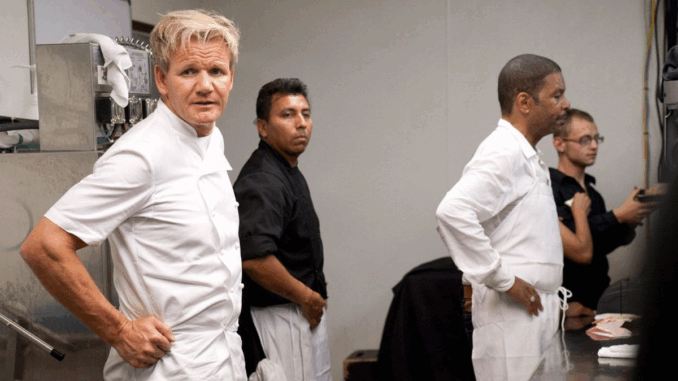
For years, Gordon Ramsay has brushed off accusations that his temper and cruelty were “just part of the act.” His defenders argue it’s entertainment — a persona designed for ratings. But in the shadows, away from the glamorous lights of Hell’s Kitchen, Kitchen Nightmares, and MasterChef, stories have piled up that paint a far darker picture. Contestants, staff, and even restaurant owners have begun to speak more candidly — and what they reveal suggests that the price of Ramsay’s empire isn’t just measured in ratings or Michelin stars, but in broken people.
One shocking confession came from a former Hell’s Kitchen contestant who described life after the show as “worse than being inside it.” According to them, the pressure, the constant belittlement, and the way the show was edited made their personal life spiral. “I couldn’t go anywhere without people quoting his insults at me. They’d call me ‘donkey’ in public. It sounds funny until you realize it follows you for years. I wasn’t a chef anymore — I was a joke.” That humiliation, magnified by millions of viewers, haunted them long after the cameras stopped rolling.
And then there’s the truth about Kitchen Nightmares. For fans, it looked like Ramsay was swooping in to rescue struggling restaurants. But many owners now insist that the intervention was the kiss of death. “We thought he’d help us,” one owner revealed, “but he came in, screamed at us, embarrassed us on national television, and then left. Business didn’t improve — it got worse. Locals stopped coming because we were branded as failures.” Another admitted they were pressured by producers to exaggerate their incompetence, creating caricatures for entertainment. “It ruined our reputation permanently,” they said. In the end, the “nightmare” wasn’t just the failing business — it was Gordon Ramsay himself.

Perhaps the most damning revelations come from crew members who worked behind the scenes. One ex-producer claimed Ramsay’s fury wasn’t limited to contestants. “People think it’s just on camera. It’s not. Off-camera, he could be brutal with staff too. There was constant turnover. Some couldn’t handle the screaming. Others just burned out. The truth is, working for Ramsay was as much a nightmare as being on his shows.” Another former colleague recalled how everything revolved around keeping Ramsay’s temper in check. “Entire days were structured around avoiding his explosions. It wasn’t a healthy workplace. It was survival.”
And then there’s the disturbing suggestion that some winners of Hell’s Kitchen never actually got the dream jobs promised to them. Instead, they were shuffled aside, their “victory” used for TV drama but not honored in reality. One former winner admitted, “The contract was vague. What I got wasn’t what was shown. It was humiliating because everyone thought I’d made it. But the truth was, I hadn’t.” These claims strike at the heart of Ramsay’s credibility. If the prizes weren’t always real, then what else about the shows was manipulated for drama?
Even Ramsay’s own words have come back to haunt him. In one interview, he insisted: “I’m not playing a character. This is me — raw, real, passionate.” But for critics, that statement is chilling, not comforting. Because if it’s not an act, then the cruelty isn’t scripted — it’s who he truly is. “That was the moment I realized,” said one former contestant, “he wasn’t pretending. He really enjoyed breaking people down.”
The mounting stories create a picture of a man whose empire thrives on humiliation, fear, and broken promises. And perhaps the most unsettling part is how long he’s gotten away with it. For years, audiences cheered, networks profited, and Ramsay built an image of being the fiery genius who tells it like it is. But behind that image lies a string of casualties: contestants who needed therapy, owners whose businesses collapsed, staff who quit in exhaustion, and even winners who discovered their fairy tale prize was a mirage.
The truth is no longer easy to ignore. Gordon Ramsay didn’t just build a TV empire — he built it on people’s pain. And now, as more voices come forward, the cracks in his legacy grow wider. The world once laughed at his insults. Now, many are asking: was the joke really worth it, when so many lives were left in ruins?